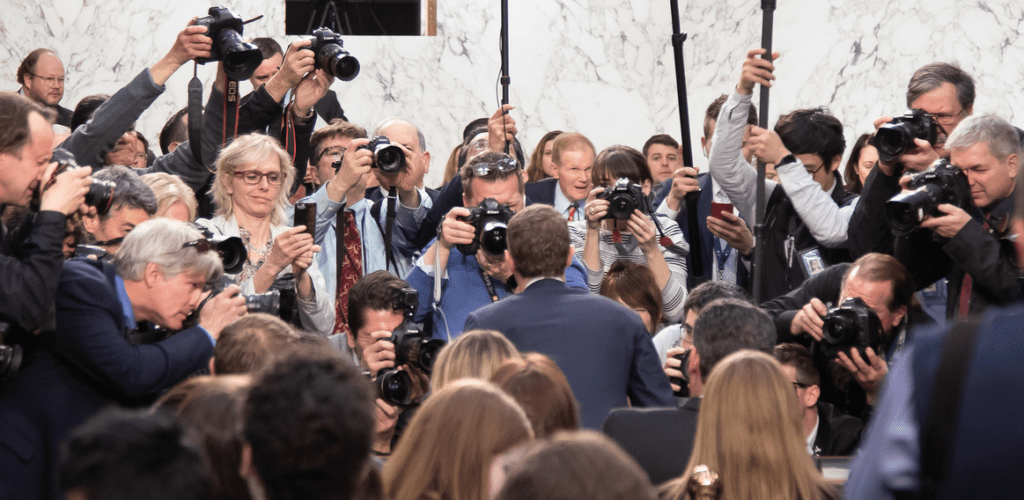Covering Zuck in a Suit on the Hill
By • April 12, 2018 0 815

Covering the Capitol as a news reporter isn’t like it used to be. The new intensity was evident over the past two days, April 11 and 12, during some 14 hours of hearings (also described as “grillings”) that focused on Facebook creator Mark Zuckerberg.
It used to be fairly sedate and wonky to cover Congress. A few reporters could get personal interviews with “witnesses” and even the congressional representatives at the end of a long hearing. The press galleries next to the third-floor viewing areas of the House and Senate Chambers, with long desks where print reporters can write, were often sparsely populated. In the press lounge areas, there was generally room for reporters to zonk out in the leather chairs and reading areas when not working on stories at their designated desks.
Congressional hearings and markup and other committee meetings in the House and Senate Office Buildings on Constitution and Independence Avenues were usually covered by junior reporters. They turned on digital recorders and computers and spent their time scanning mainly background and internet information as the hearing or meeting droned on. Each “gentleman and gentlewoman” of Congress asked questions (or just made statements for the record) during his or her allotted five to 10 minutes before each of the four or five expert witnesses was called to testify at a hearing. Hearings typically lasted for a couple of hours.
The feeling among the press always was that most of the glamorous news action takes place in the White House, covering the president and his wife. Congress was for long, serious discussions of policy and slow enactment of the legislative process.
But things have changed in the Trump era. News attention has turned increasingly to Congress as major issues such as immigration and tax reform and continual confirmation hearings for new nominees for Cabinet positions and even Supreme Court justices take place on the Hill.
Now, often the Congressional press galleries, lounges and eating areas are crowded with credentialed members of the working press. Many reporters end up sitting on corridor floors or steps surrounding the galleries and hearing rooms to write up and post breaking stories. The press tables and hearing rooms are packed with reporters even as large publications are restricted to just one or two.
During the Zuckerberg hearings, rope and drawn lines were established by congressional security for all reporters — broadcast, television and print — in the corridors near the elevators and escalators leading from the Capitol to congressional offices. Radio and TV reporters in particular will stake out interview areas there, often for hours, for the possibility of grabbing a breaking news quote from a key congressional representative or witness who scurries by.
Increasingly, press officials worry about the safety and protection of Capitol visitors and staff, officials and reporters themselves (as well as Capitol treasures) from crowding, stumbling and even just spilled coffee and gooey sandwich remains placed on the bases of statues and marble staircase ledges.
As Zuckerberg was grilled endlessly about privacy concerns and bias at Facebook by the Senate Judiciary Committee and the Senate and House Commerce Committees, TV crews outside the hearing rooms were allowed a few pool camera reporters in at a time. The more than 100 press seats at long tables in the front of the hearing room were quickly filled by credentialed reporters, with many more delegated to rooms with a TV feed.
Reporters had to be creative in covering an event where there were hundreds with the same assignment.
Fashion reporters commented variously about the rare sight of Zuckerberg, the famously casual Facebook CEO, in a suit. Some declared his tie too big and too loose (it looked like it had been pre-tied) and criticized his tight, monk-like haircut. Others declared Zuckerberg now “a suit.”
Many writers commented on the extent of Zuckerberg’s contriteness for “mistakes made.” The description of his mistakes varied by publication: they included mistakes of privacy, transparency and, for some, “exploiting the platform to influence U.S. elections.”
Various conclusions were made by reporters at the end. Some media focused on the threat of future regulation of Facebook. “Mark hints at future fees,” some ominously noted, referring to the famously free communication service. Others warned about or recommended “comprehensive” legislation.
The eager coverage of hundreds of reporters covering hearings and votes in Congress now have changed the atmosphere of Congressional reporting. It could signal, for better or worse, a new attention and even pressure on congressional actions rather than executive ones.

